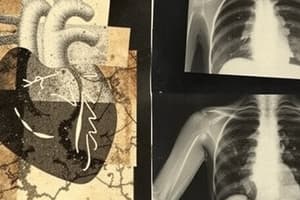Podcast
Questions and Answers
What is a crucial part of a physical examination that helps identify cardiovascular disease risk factors?
What is a crucial part of a physical examination that helps identify cardiovascular disease risk factors?
- Neurological assessment
- Gastrointestinal assessment
- Cardiovascular assessment (correct)
- Respiratory assessment
Which of the following is NOT a risk factor for cardiovascular disease?
Which of the following is NOT a risk factor for cardiovascular disease?
- Obesity
- Hyperlipidemia
- Hypertension
- Family history of cancer (correct)
What is the purpose of palpation in a cardiovascular physical examination?
What is the purpose of palpation in a cardiovascular physical examination?
- To measure blood pressure
- To listen for heart sounds
- To feel for the apical pulse (correct)
- To inspect for signs of heart failure
Which diagnostic test measures the electrical activity of the heart?
Which diagnostic test measures the electrical activity of the heart?
What is the purpose of an ankle-brachial index (ABI) test?
What is the purpose of an ankle-brachial index (ABI) test?
Which of the following is a symptom of cardiovascular disease?
Which of the following is a symptom of cardiovascular disease?
What is the purpose of auscultation in a cardiovascular physical examination?
What is the purpose of auscultation in a cardiovascular physical examination?
Which diagnostic test uses ultrasound to visualize the heart and its structures?
Which diagnostic test uses ultrasound to visualize the heart and its structures?
Study Notes
Overview of Cardiovascular Assessment
- Cardiovascular assessment is a crucial part of a physical examination that helps identify cardiovascular disease risk factors, diagnose cardiovascular conditions, and monitor treatment effectiveness.
- The assessment involves a combination of medical history, physical examination, and diagnostic tests.
Medical History
- Risk factors:
- Hypertension
- Hyperlipidemia
- Diabetes
- Smoking
- Family history of cardiovascular disease
- Symptoms:
- Chest pain or discomfort (angina)
- Shortness of breath (dyspnea)
- Fatigue
- Swelling in the legs or feet (edema)
- Palpitations or irregular heartbeats
Physical Examination
- Vital signs:
- Blood pressure
- Heart rate
- Respiratory rate
- Oxygen saturation
- Inspection:
- Observe for signs of heart failure (e.g., jugular venous distension, peripheral edema)
- Note the shape and size of the heart
- Palpation:
- Feel for the apical pulse
- Check for thrills or heaves (abnormal heart sounds)
- Auscultation:
- Listen for heart sounds (S1, S2, S3, S4)
- Identify murmurs or abnormal sounds
Diagnostic Tests
- Electrocardiogram (ECG or EKG):
- Measures the electrical activity of the heart
- Helps diagnose arrhythmias, myocardial infarction, and cardiac chamber enlargement
- Echocardiogram:
- Uses ultrasound to visualize the heart and its structures
- Assesses cardiac function, valve function, and blood flow
- Stress test:
- Measures the heart's response to physical activity or medication
- Helps diagnose coronary artery disease and assess cardiac function
Additional Assessments
- Ankle-brachial index (ABI):
- Measures blood pressure in the legs compared to the arms
- Helps diagnose peripheral artery disease
- Carotid duplex ultrasound:
- Assesses blood flow in the carotid arteries
- Helps diagnose carotid artery stenosis
Cardiovascular Assessment
- Cardiovascular assessment is crucial for identifying cardiovascular disease risk factors, diagnosing cardiovascular conditions, and monitoring treatment effectiveness.
Medical History
- Risk factors for cardiovascular disease include:
- Hypertension
- Hyperlipidemia
- Diabetes
- Smoking
- Family history of cardiovascular disease
- Symptoms of cardiovascular disease include:
- Chest pain or discomfort (angina)
- Shortness of breath (dyspnea)
- Fatigue
- Swelling in the legs or feet (edema)
- Palpitations or irregular heartbeats
Physical Examination
- Vital signs measured during cardiovascular assessment include:
- Blood pressure
- Heart rate
- Respiratory rate
- Oxygen saturation
- Inspection involves:
- Observing for signs of heart failure (e.g., jugular venous distension, peripheral edema)
- Noting the shape and size of the heart
- Palpation involves:
- Feeling for the apical pulse
- Checking for thrills or heaves (abnormal heart sounds)
- Auscultation involves:
- Listening for heart sounds (S1, S2, S3, S4)
- Identifying murmurs or abnormal sounds
Diagnostic Tests
- Electrocardiogram (ECG or EKG) measures the electrical activity of the heart and helps diagnose:
- Arrhythmias
- Myocardial infarction
- Cardiac chamber enlargement
- Echocardiogram uses ultrasound to visualize the heart and its structures and assesses:
- Cardiac function
- Valve function
- Blood flow
- Stress test measures the heart's response to physical activity or medication and helps diagnose:
- Coronary artery disease
- Cardiac function
Additional Assessments
- Ankle-brachial index (ABI) measures blood pressure in the legs compared to the arms and helps diagnose:
- Peripheral artery disease
- Carotid duplex ultrasound assesses blood flow in the carotid arteries and helps diagnose:
- Carotid artery stenosis
Studying That Suits You
Use AI to generate personalized quizzes and flashcards to suit your learning preferences.
Description
Learn about the importance of cardiovascular assessment, risk factors, and diagnostic methods used to identify cardiovascular disease risk factors and diagnose conditions.



